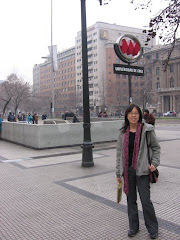Finally got to head down south again, and see the results of our project for ourselves! I think when I look back on my year in Peru, this earthquake relief effort will be rank as one of the projects I'm proudest of. Here's my official report on what we did last week.
*****
On Thursday, February 7, a group representing the Misión Reformada en el Perú joined Sociedad Biblica Peruana on their eleventh voyage to the south, to deliver aid to the victims of the August 15 earthquake. The group from MRP consisted of Missionary Bill Bradford, Pastor and Administrator Jaime Avellaneda, Lawson Konvalinka of our Microfinance program, and Clara Lee in Communications. The group from SBP included project manager Manuel Ortiz, María Chamán, Fiorella Pomareda, and Sonia León from MISIUR.
The Misión Reformada en el Perú (MRP) is based in Trujillo, in the north of Peru. We had sent out a call for help to our supporters in the United States shortly after the earthquake, and Pastor Jaime Avellaneda had made two previous trips to the earthquake zone, but the mission was located too far away to execute an aid project. Therefore we decided to support Sociedad Biblica's project to bring aid to the rural regions of Castrovirreyna in Huancavelica, and the areas surrounding Ica. This was our first opportunity to join SBP on one of their voyages to see the impact that the project was having.
We left Lima around 5am in two rented 4x4 pickup trucks and drove south along the Panamericana Highway, passing more and more piles of rubble and empty lots where buildings had fallen down. It appeared that some cleanup had taken place, and water, roads and electricity all seemed to be back to normal, but not much reconstruction had actually been accomplished. We finally arrived in the town of San Jose de los Molinos outside of Ica around 10am. Here Manuel Ortiz, SBP's project manager, convened with the local authorities before we headed on to Galagarza, a farming community under the jurisdiction of San Jose de los Molinos.
The community consisted of a number of shelters made of woven straw mats and plastic sheets, held together by wooden poles. There were a few conspicuous new brick buildings, unfinished, which had been built by an NGO but were still lacking roofs. The residents told us our calaminas (corrugated metal roofing material) were an answer to prayer!
After a word of greeting and encouragement from Manuel and Fiorella Pomareda (also of SBP), we began to unload the truck and register the aid recipients. Each family had pre-registered with the municipal government to receive 30 square meters of calaminas, as well as a Bible and one blanket per child. Now they had to line up and sign the registry before receiving a ticket to claim their aid at the truck.
It was near midday, and the sun was blazing hot as the young men hired with the truck hauled nearly 1500 pieces of sheet metal and heavy bundles of blankets out for distribution. The team from MRP and SBP helped distribute Bibles, blankets and nails and took pictures of each recipient as an additional record-keeping measure. Most of the residents claiming their aid were women with children, some of them elderly; most of the men in the community were out working. There was also a crowd of children, teenagers and stray dogs gathered to watch the excitement.

After nearly five hours of distribution, we enjoyed some fresh watermelon and packed up the truck. Over 100 families had received roofing. As we gathered in a local bodega to eat a lunch prepared for us, about ten women filed in to thank us for bringing help. They particularly thanked us for the Bibles, and expressed their excitement at being able to read the word of God for themselves for the first time. Throughout the trip we were struck by the people's openness and desire for Bibles and Christian teaching. Perhaps the earthquake, with both the suffering and the aid that had followed, had opened their hearts to their need for God and for answers beyond this life.
Afterwards we visited a few more communities, some of them possibilities for future aid trips, before spending the night in Ica and heading back to Lima the next day. After seeing so much destruction, and so many people reduced to living in straw huts, we felt newly moved by the need there, as well as greatly encouraged by the organization, transparency, and foresight of Sociedad Biblica's project. To date nearly 900 families have received roofing, blankets and Bibles, many of them in time for the season of heavy rains. We thank God for this project, and for the honor of being a small part of His plan to restore the lives of the campesinos of Southern Peru.



